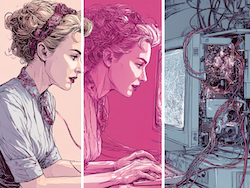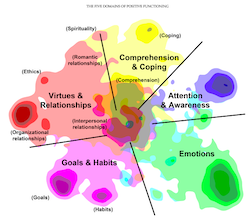Using Anthropic's AI not just for help, but as a gentle rehearsal space for setting boundaries and practicing scripts for life's hard conversations.
I used to think AI was just for getting things done faster. You know, the usual suspects: writing emails, brainstorming ideas, maybe helping with some research when I was too tired to think straight. But somewhere between asking Claude to help me draft yet another "thanks but no thanks" email and having it walk me through why I felt guilty about every boundary I tried to set, I realized something: this wasn't just productivity anymore. This was therapy.
Well, not actual therapy—let's be clear about that. But it was something I'd never had before: a judgment-free space to practice being the person I actually wanted to be instead of the people-pleasing pushover I'd trained myself to become.
The Accidental Discovery
It started with a work thing, naturally. My manager had asked me to take on another project—the fourth "quick favor" that month—and I was staring at my laptop screen, cursor blinking in an empty email draft, paralyzed by my own inability to just say no. Instead of writing the email, I found myself typing into Claude: "How do I tell my boss I can't take on more work without sounding lazy or difficult?"
What happened next surprised me. Claude didn't just give me a template email (though it offered that too). It asked me questions. What specifically about saying no feels difficult for you? What's the worst thing you imagine happening if you set this boundary? What would you tell a friend in this situation?
Suddenly, I wasn't just getting help with a work problem—I was getting help with a me problem. And for someone whose brain often feels like it's running seventeen different anxiety simulations simultaneously, having a place to slow down and actually examine those thoughts was revolutionary.
The Rehearsal Space I Never Knew I Needed
Here's the thing about being neurodivergent and chronically overwhelmed: every social interaction feels like a high-stakes performance where you're not entirely sure of your lines. You know you should set boundaries, but the gap between knowing and doing feels like a canyon you can't figure out how to cross.
Claude became my rehearsal space. Not because it's human (it's not), but because it's endlessly patient and never gets tired of me practicing the same conversation seventeen different ways until I find the version that feels authentic.
"I need to tell my friend I can't help her move this weekend because I'm already overstimulated from a work deadline," I'd type. "But I feel guilty because she helped me last month."
"Let's explore that guilt," Claude would respond. "What are you really afraid will happen if you're honest about your limits?"
And we'd dig into it. The fear that saying no makes me a bad friend. The assumption that my struggles with overwhelm are less valid than someone else's physical fatigue. The way I'd learned to treat my own needs as optional add-ons rather than basic requirements for functioning.
Learning to Speak My Own Language
One of the most valuable things Claude taught me was that boundaries don't have to sound like corporate buzzwords or therapy-speak to be effective. I don't have to say "I'm practicing radical self-care by honoring my capacity limits." I can say "I'm wiped out and won't be good company right now, but how about we reschedule for next week?"
The AI helped me find my actual voice—not the one I thought I should have, but the one that felt true to how I actually talk and think. It turns out authenticity is way more compelling than perfection, and people respond better to genuine humanity than to polished deflection.
We practiced everything. How to say no to social plans without offering seventeen alternative dates as penance. How to tell my family I need space without explaining my entire mental health history. How to push back on unrealistic deadlines without writing a dissertation on why the timeline doesn't work.
The Unexpected Confidence Boost
The weird thing about practicing boundaries with AI is that it actually makes you better at setting them with humans. Not because Claude is particularly human-like, but because the practice removes the emotional charge. When you've already worked through your anxiety about a conversation in a low-stakes environment, the actual conversation feels less terrifying.
I started noticing changes in my real-world interactions. I stopped apologizing for things that weren't my fault. I began ending conversations that weren't going anywhere instead of staying trapped in them out of politeness. I learned to say "let me think about that and get back to you" instead of immediately agreeing to things I didn't want to do.
The Ripple Effect
The boundaries I started setting with Claude's help didn't just make my life easier—they made me a better friend, coworker, and human. When you're not constantly overwhelmed and resentful because you can't say no, you have more genuine energy for the things and people you actually care about.
My relationships improved because I stopped showing up as a martyr and started showing up as myself. My work got better because I wasn't spread so thin that everything I touched turned to mediocrity. My mental health stabilized because I wasn't constantly battling the resentment that comes from saying yes when you mean no.
Your Turn
If you're reading this and recognizing yourself in the people-pleasing, boundary-struggling, perpetually overwhelmed category, maybe it's time to experiment. You don't need to wait for the perfect moment or the right words. You don't need to have it all figured out before you start.
Open up Claude (or whatever AI you prefer), and start with something small. "I need help saying no to [specific situation]." See what happens when you give yourself permission to practice being the person you want to be instead of the person you think you should be.
Because here's what I learned: the goal isn't to become someone who never struggles with boundaries. The goal is to become someone who has tools for navigating those struggles—and sometimes, the most powerful tool is simply having a safe place to practice being brave.
What boundary are you ready to practice setting? The conversation might be easier than you think.
Stay Informed and Inspired
Join our community of forward-thinkers and gain insights into AI communication and storytelling. Subscribe to our newsletter for the latest updates and exclusive resources.





